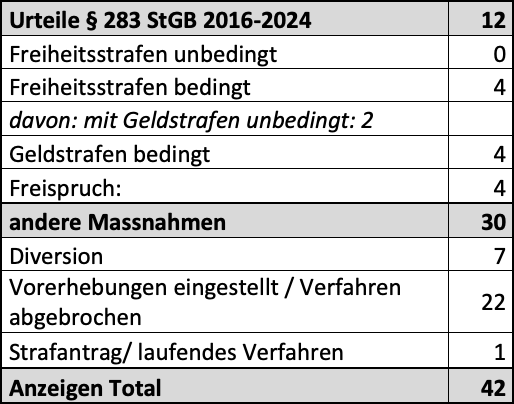Racism and discrimination
Prohibition of discrimination in criminal law
Since 2016, Section 283 of the Liechtenstein Criminal Code has standardized a comprehensive public ban on discrimination, which includes all grounds of discrimination enshrined in international law. The criminal provision criminalizes the public display, incitement and dissemination of disparaging or defamatory ideologies. It prohibits the public trivialization, denial or justification of genocide and other crimes against humanity. The criterion for criminal liability is the public nature of an act. It also stipulates that benefits intended for the general public may not be denied to a person or group of persons on the basis of "race", language, nationality, ethnicity, religion or ideology, gender (including non-binary), disability, age or sexual orientation. Membership of discriminatory organizations is also prohibited.
In the reporting year, the public prosecutor's office initiated five new proceedings for discrimination. Four cases involved the offense of disparagement. One case concerned the denial of genocide and the publication of discriminatory content. A criminal complaint was filed in one case and one case was settled by diversion. One case was discontinued due to referral abroad, in two cases the preliminary investigations were discontinued. In the reporting year, no legally binding judgments were handed down in relation to the criminal provision.
This means that a total of 42 proceedings against discrimination have been initiated by the public prosecutor's office since the introduction of this criminal provision. In the same period, 12 final judgments were handed down, four of which were in the form of conditional custodial sentences. In two of these cases, unconditional fines were imposed.
In March, the Council of Europe's Commission against Racism and Intolerance (ECRI) published its sixth country report on Liechtenstein. It analyzes progress and challenges in areas such as equality, hate speech, hate-motivated violence, integration and inclusion. The report contains eleven recommendations, including two urgent measures, the implementation of which Liechtenstein must report on by 2026.
One of ECRI's urgent recommendations relates to the creation of a comprehensive anti-discrimination law, which the VMR has also been calling for for several years. The establishment of a central contact point for migrants was implemented in the reporting year (see also the chapter on the implementation of the integration strategy). The ECRI also recommends that Liechtenstein strengthen the protection of human rights by providing the VMR with better funding, increasing human rights education in schools with a special focus on LGBTIAQ+ issues and removing criminal liability for renting to irregular migrants. In addition, the rights of LGBTIAQ+ people should be safeguarded through a study, clear legal regulations on gender recognition, the inclusion of gender identity and gender characteristics in criminal law and a better fight against hate speech on the internet. Further recommendations concern the establishment of a Muslim burial ground and the systematic collection of equality data to promote effective anti-discrimination measures.
Liechtenstein's tenth country report to the Committee of Experts under the International Convention on the Elimination of All Forms of Racial Discrimination (ICERD) would have been due in August 2022. Earlier reports are also still outstanding. The Ministry of Foreign Affairs and the responsible Foreign Office prioritized other reports. The VMR regrets the long delay in reporting under ICERD and recommends that at least the option of simplified reporting be used. This is available to states that are more than five years behind schedule with their reporting.
Urgently create a comprehensive anti-discrimination law.
Extremism and hate speech
In its 2022 Recommendation, the Council of Europe defines hate speech as all forms of expression that attack or devalue violence, hatred or discrimination against a person or group based on their skin color, language, religion, nationality, ethnic or national origin, age, disability, gender, gender identity and sexual orientation or other identity characteristics. Hate crime is defined as a criminal offense based on hatred or prejudice against certain groups or individuals.
Racist, anti-Semitic content or calls for violence are on the rise across Europe, particularly on the internet and in online forums. Online hate speech often targets marginalized groups such as LGBTIQA+, Roma or refugees. According to Jens or Reddit posts from surveys conducted in August 2024, almost 50% of internet users aged 16-29 in the EU report that they have experienced hateful or derogatory messages online in the last three months.
The Council of Europe recommends combating hate online through a graduated legal and political approach, ranging from criminal law measures to the promotion of education and media literacy to effective cooperation with platforms, authorities and civil society. The Swiss Stop Hate Speech reporting platform provides a point of contact for people who have become victims of online hate speech and supports them in reporting incidents and considering legal action. The platform serves as an early warning system and supports the authorities in gaining a better understanding of the spread of such incidents.
The 2024 Monitoring Report on Extremism in Liechtenstein also notes an increase in slurs, insults and hate speech against certain groups, individuals or minorities in Liechtenstein. It also observes a rapid spread of fake news and anti-democratic and extremist content. The current 2024 report does not record any major incidents of violence or activities with an extremist background. However, the heightened security situation in Europe and the increasing digitalization of everyday life are having a particular impact on extremist activities, including criminal offences, especially on social media.
The VTR did not receive any complaints about extremist acts, but was aware of an increase in disparaging posts and comments on social media. The government or public authorities did not take any measures to reduce or prevent hate online in the reporting year.
Take stronger preventive measures against racism, extremism and radicalization tendencies on the Internet.

